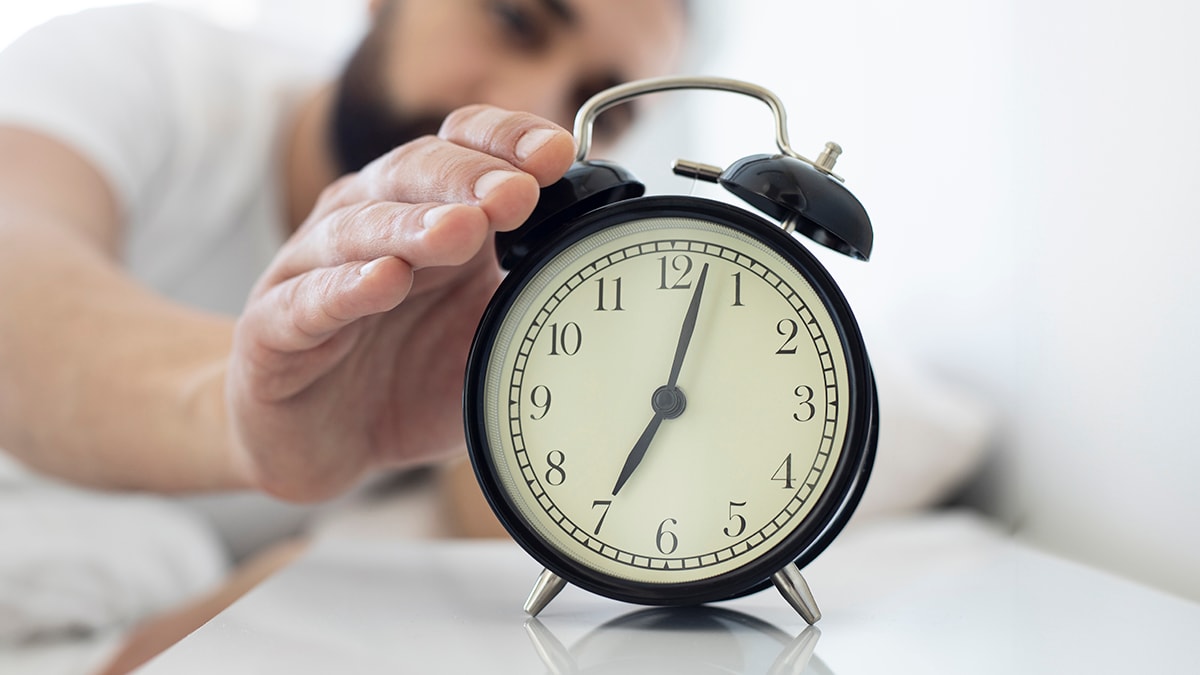Key points
- Getting good sleep isn’t just important for your energy levels—it’s critical for your heart health, too.
- Sleep helps your body repair itself. Getting enough good sleep also helps you function normally during the day.

How much sleep do I need?
Most adults need at least 7 hours of sleep each night.1 However, more than 1 in 3 American adults say they don't get the recommended amount of sleep.2 While this may be fine for a day or two, not getting enough sleep over time can lead to serious health problems—and make certain health problems worse.
Steps to take
- Stick to a regular sleep schedule. Go to bed at the same time each night and get up at the same time each morning, including on the weekends.
- Get enough natural light, especially earlier in the day. Try going for a morning or lunchtime walk.
- Get enough physical activity during the day. Try not to exercise within a few hours of bedtime.
- Avoid artificial light, especially within a few hours of bedtime. Use a blue light filter on your computer or smartphone.
- Don't eat or drink within a few hours of bedtime; avoid alcohol and foods high in fat or sugar in particular.
- Keep your bedroom cool, dark, and quiet.
Work with your health care team to identify obstacles to good sleep, including other medical conditions.
What health conditions are linked to a lack of sleep?
Adults who sleep fewer than 7 hours each night are more likely to say they have had health problems, including heart attack, asthma, and depression.3 Some of these health problems raise the risk for heart disease, heart attack, and stroke. These health problems include:
High blood pressure. During normal sleep, your blood pressure goes down. Having sleep problems means your blood pressure stays higher for a longer period of time.4 High blood pressure is one of the leading risks for heart disease and stroke. Nearly half (48.1%) of adults in the United States have high blood pressure.5
Type 2 diabetes. Diabetes is a disease that causes sugar to build up in your blood, a condition that can damage your blood vessels. Some studies show that getting enough good sleep may help people improve blood sugar control.6
Obesity. Lack of sleep can lead to unhealthy weight gain. This is especially true for children and adolescents, who need more sleep than adults. Not getting enough sleep may affect a part of the brain that controls hunger.6
What sleep conditions can hurt my heart health?
Over time, sleep problems can hurt your heart health.
Sleep apnea happens when your airway gets blocked repeatedly during sleep, causing you to stop breathing for short amounts of time. Sleep apnea can be caused by certain health problems, such as obesity and heart failure.
Sleep apnea affects how much oxygen your body gets while you sleep and increases the risk for many health problems, including high blood pressure, heart attack, and stroke. It is more common among Black, Hispanic, and Native American adults than among White adults.7
Insomnia refers to trouble falling sleep, staying asleep, or both. As many as 1 in 2 adults experiences short-term insomnia at some point, and 1 in 10 may have long-lasting insomnia.8 Insomnia is linked to high blood pressure and heart disease. Over time, poor sleep can also lead to unhealthy habits that can hurt your heart, including higher stress levels, less motivation to be physically active, and unhealthy food choices.
- Centers for Disease Control and Prevention. How much sleep do I need? Accessed September 8, 2020. https://www.cdc.gov/sleep/about/
- Liu Y, Wheaton AG, Chapman DP, Cunningham TJ, Lu H, Croft JB. Prevalence of healthy sleep duration among adults—United States, 2014. MMWR Morb Mortal Wkly Rep. 2016;65(6):137–141.
- Centers for Disease Control and Prevention. Data and statistics: short sleep duration among US adults. Accessed September 8, 2020. https://www.cdc.gov/sleep/data-research/facts-stats/
- Calhoun DA, Harding SM. Sleep and hypertension. Chest. 2010;138(2):434–443.
- Centers for Disease Control and Prevention. Hypertension Cascade: Hypertension Prevalence, Treatment and Control Estimates Among U.S. Adults Aged 18 Years and Older Applying the Criteria From the American College of Cardiology and American Heart Association’s 2017 Hypertension Guideline—NHANES 2017-2020. Published 2023. Accessed May 3, 2024.
- Centers for Disease Control and Prevention. Sleep and chronic disease. Accessed September 8, 2020. https://www.cdc.gov/sleep/data-research/facts-stats/adults-sleep-facts-and-stats.html
- National Heart, Lung, and Blood Institute. What is sleep apnea? Accessed April 24, 2024. https://www.nhlbi.nih.gov/health-topics/sleep-apnea
- Sateia MJ, Buysse DJ, Krystal AD, Neubauer DN, Heald JL. Clinical practice guideline for the pharmacologic treatment of chronic insomnia in adults: an American Academy of Sleep Medicine clinical practice guideline. J Clin Sleep Med. 2017;13(2):307–349.
